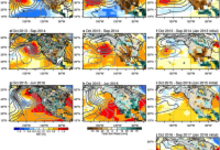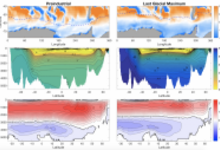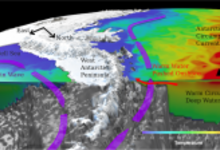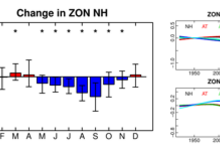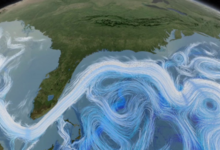Research Highlights
We aim to feature the latest research results from US scientists whose published paper features work that is sponsored by one or more sponsoring agency programs of US CLIVAR (NASA, NOAA, NSF, DOE, ONR). Check out the collection of research highlights below and sort by topic on the right. Interested in submitting an article for consideration? See our Research Highlight Submission Guidelines page for more information.
Researchers have developed a state-of-the-art drought and wildfire prediction system, showing the multi-year predictive skills of drought and wildfire conditions beyond the typical timescale of seasonal climate forecast models.
A recent study investigates the drivers of changes in deep ocean circulation across a range of modern and Last Glacial Maximum (~21000 years ago) climate modeling simulations, revealing biases in Antarctic sea ice formation.
Ocean melting of marine-terminating ice sheets poses a profound threat to the global coastal environment with approximately five meters of sea level rise locked up in the ice sheets around the West Antarctic region.
Looking at modeling simulations, researchers explore how various characteristics of the mid-latitude atmospheric circulation evolve over the 21st-century and find that changes are sector-dependent.
NASA and MIT scientists found that gases are more easily absorbed over time than heat. As the Atlantic Meridional Overturning Circulation (AMOC) slows down, the ocean absorbs less of both atmospheric gases and heat, though its ability to absorb heat is more greatly reduced.

